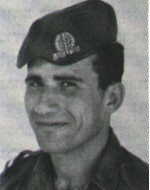Son of David and Esther. Was born in Cairo, Egypt, on April 4, 1943. He attended a Christian school of the Cairo aristocracy together with twelve Jewish students, but during the Sinai Campaign Baruch began to feel uncomfortable at school and decided to persuade his parents to immigrate The parents agreed – and in 1957 they left Egypt and after a few weeks arrived in Israel via Greece and settled in Hatzor, during which they could not hide their joy at immigrating to Israel and their dream of fighting for it. , And at the age of fourteen his parents performed a “Bar Mitzvah” at the “Rambam” synagogue of the immigrants from Egypt in Hatzor. After the years of welfare in Egypt, life in Israel was difficult, but Baruch would say: “It is better to live in our country than in wealth among gentiles.” Thus he strengthened his parents’ hands and removed the despair from their hearts. He studied at the Mishkan Elementary School. From an early age, sport has taken up a large part of his life. Although his parents pressed him to learn a profession, but even during his studies he would return to the sport and deal only with him. His mother, who was concerned for his health and well-being, was reassuring: “I am immune, nothing can happen to me.” He was very attached to children whose parents had difficulty in their education and therefore organized many sports activities to help prevent delinquency among them. After completing his studies in Hatzor, he went with his friends to Nahalal to study at the WIZO High School and graduated there in 1961. He was a lively and lively young man who kept himself away from the controversy. Baruch volunteered for the IDF in November 1962. He volunteered to serve in the Paratroopers Brigade and claimed to his parents that if he and his comrades did not volunteer for the paratroopers, then who would volunteer for that corps? In the Six Day War he fought for the liberation of Jerusalem, and he always said: “Mom, when I have time, I will take you and Avi to Jerusalem to see the streets I fought in.” But this promise was not fulfilled. Since completing his compulsory service, he has married a wife, raised a family and had a daughter. His father says that he once asked him to try and get out of reserve service because he was paralyzed then and remained without help, but Baruch replied: “I have a job and the army will not work out without me. Before leaving for the last reserve duty, he told his daughter, who deposited her in his parents’ home before leaving: “Limor, when I come back I want to hear you say ‘Dad.'” But he did not win. On Tuesday, July 18, 1969, he fell in an enemy shell near the Suez Canal, leaving a wife and a daughter, who was brought to rest in the Hatzor cemetery. Of the liberation of Jerusalem, he sat with us on the borders in the war against terrorists and infiltrators, and he was fond of us all with his kindness, with boundless journeys and with the ability to carry out unimaginable tasks, And in this battle Baruch fell, the battalion lowered its flag and stood at attention in his memory. “My acquaintance with Baruch was short – less than two weeks – from the day we arrived in the canal until the day he fell, and during these two weeks he made a great impression as a man and a friend and as a soldier and an outstanding commander. All the commanders recommended that Baruch be most properly accepted for the job, both in his own rightAs well as his work experience from the time of his regular service. From the moment he assumed the position, the face of the stronghold changed, bringing in a work atmosphere in a friendly spirit. Within a few days we achieved tremendous productivity in all the areas he dealt with: operational efficiency, I could not remember seeing him sleep more than two hours in a row, and he had a bad feeling that he could not go into operational activities (such as patrols) and so he made sure to stroke himself, in addition to his regular work, To meet this effort, there was great satisfaction when the exchange of fire began And he used to run there himself, where he would sit for the duration of all the exchanges of fire – – – during the two weeks We had a bed next to a bed and heard a lot about his wife and daughter (whom he talked about a great deal), his parents, Hatzor, and his sporting activities – on the morning of the last day of his life he received a telegram from his home asking him to come home urgently. But a few hours after the telegram was received, mortars and machine guns were opened. Every soldier ran to his position according to the practice. Baruch ran to his favorite machine gun to fire – and on his way he was hit by a mortar shell and fell. “The Hatzor local council published a pamphlet in Baruch’s memory, and his name was commemorated in the” Leaflet for the Fallen. “
